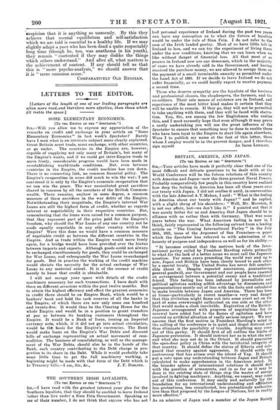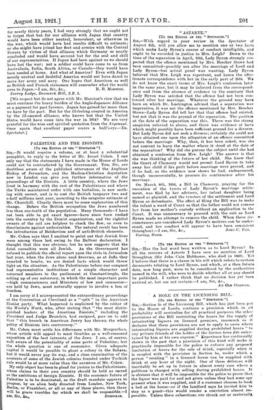BRITAIN, AMERICA, AND JAPAN. (To THE EDITOR OF THE "
SPECTATOR.")
Sm,—Your articles have made it perfectly clear that one of the most difficult and delicate questions to be dealt with at the World Conference will be the future relations of this country with America and Japan—now the three greatest Naval Powers. Probably comparatively few people in this country have realized how deep the feeling in America has been all these years over our treaty with Japan. I did not realize it until, in conversation with the late Admiral A.T.Mahan, I said : " What is the feeling in America about our treaty with Japan? " and ho replied, with a slight shrug of his shoulders : Well, Mr. Marston, It is not our affair, but—we don't like it." I pointed out that it was surely better for us and America that Japan should be in alliance with us rather than with Germany. That was some years before the war. What American feeling is now is, I think, fairly represented in the following extract from a leading article on " The Coming International Parley " in the July 16th, 1921, issue of the Argonaut of San Francisco—a paper which the Spectator has referred to with admiration of its honesty of purpose and independence as well as for its ability :- " It becomes evident that the motives back of the Inter- national parley called by President Harding relate primarily to what for the lack of a better name we must call the Japanese question. For some years preceding the world war and up to now, Japan and Britain have been closely bound to each other by a special treaty. The United States has never felt comfort. able about it. Despite repeated assurances, guaranteeing general goodwill, our Government and our people have resented an arrangement between a potential enemy and a traditional friend. This feeling has been inflamed by journalistic and political agitators seeking selfish advantage by discussions and representations mostly out of lino with the facts and calculated to make trouble between Japan and America. There has been at times—particularly in recent months—a very real danger that this irritation might flame out into some overt act on the part of some overwrought enthusiast on one side or the other that would make a clash inevitable. Expiration of the British. Japanese arrangement with progress of negotiations for its renewal have added fuel to the flames of agitation and have created an artificial situation of really serious import. We may assume that the first motive in President Harding's mind in the calling of the conference is to quiet and dispel distrust and thus eliminate the possibility of trouble. Anything may come out of this parley. It should first of all outline the limits of Japanese pretension. It should instruct her as to what she may and what she may not do in the Orient. It should guarantee the open-door policy in China with the territorial integrity of that country. It should define the status of Siberia and safe- guard that country against aggression. It should settle the controversy that has arisen over the island of Yap. It should put a veto upon any understanding between Japan and Britain calculated to make apprehension in the American mind. In the broader sphere of international relations it should deal with the question of armaments, and in so far as it may be done in the existing state of things stop the wastes of energy involved in fighting machinery. Anything, we repeat, may come out of this conference. It may easily and naturally lay the foundation for an international understanding and affiliation less pretentious, lees complicated, less pretentiously authorita- tive than that proposed by the League of Nations, but in reality more effective."
As an admirer of Japan and a member of the Japan Society
for nearly thirty years, I feel very strongly that we ought not to forget that but for our alliance with Japan that country would have been either neutral, benevolent, or otherwise in the war, which would have had results difficult to estimate; or he might have joined her fleet and armies with the Central Powers by virtue of that alliance which Germany so nearly concluded and would have secured but for the zeal and skill of our representatives. If Japan had been against us we should have lost the war; not a soldier could have come to us from Australasia, India, South Africa, or Canada—they would have been needed at home. And what of America? Even with Japan merely neutral and doubtful America would not have dared to move her army and navy. One hopes that American as well as British and French statesmen will remember what the world
owes to Japan.—I am, Sir, &e., R. B. MARSTON. Surrey Lodge, Denmark Hill, S.E. 5.
[We respect but do not agree with Mr. Marston's view that we must continue the heavy burden of the Anglo-Japanese Alliance as a payment for past favours. Japan has gained far more than we have by the pact. But for the ill-feeling created in America by the ill-omened alliance, who knows but that the United States would have come into the war in 1914? We are very grateful for the wise and spirited quotation from the Argonaut. Once again that excellent paper scores a bull's-eye.—En. Spectator.]



































 Previous page
Previous page